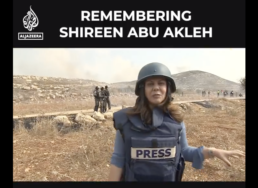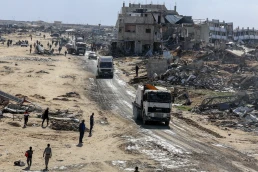It’s personal. And the U.S. is not better.
By Roxane Assaf-Lynn
In Jehane Noujaim’s documentary “Control Room,” a daring indictment of embedded media at Central Command (CENTCOM) during the 2003 U.S. invasion of Iraq, military spokesperson Marine Corps Lieutenant Josh Rushing has an epiphany. His moral compass is shaken when he recalls his own reaction to Al Jazeera’s broadcast of “American soldiers strewn about a cold tile floor.” He found it “absolutely revolting,” and even nauseating. By contrast, “equally if not more horrifying” images of bloodied civilians in Basra the night before didn’t so much as interrupt his dinner. I.e., we only care if it’s our own team suffering.
Members of the press are supposed to never become the subject of the news. Alas, when a journalist is assassinated, it makes headlines. But who’s reporting it? And how is it framed? Al Jazeera is convinced that the May 11 killing of their seasoned Palestinian American reporter Shireen Abu Akleh was the work of the Israeli military.

I am, too. It’s not a stretch. Working aside other reporters covering Israeli raids of a civilian area, each in a helmet and vest marked “Press,” two of the four were shot – Abu Akleh and fellow Al Jazeera journalist Ali Samoudi. Samoudi was shot in the back and made it to the hospital. Abu Akleh took a bullet to the head and died at the scene.
They were working in a refugee camp north of the Palestinian West Bank town of Jenin that Israel has been bombing with impunity for decades on the grounds that the Palestinians rejecting their brutal foreign military occupation are ‘militants’ or ‘terrorists.’ Their homes can be destroyed by the hundreds, and families can go from refugee to homeless (or dead) without recourse.
In the U.S., reports of the killing seem poised to lay the blame on Israel, even if not stating it outright – with the exception of The New York Times (NYT) where it’s business as usual, covering for Israel at all costs. Predictably, NYT coverage dances around the subject of a forensic investigation of Abu Akleh’s death, announcing “Palestinian Journalist, Dies, Aged 51,” as though from natural causes. The appearance of balance is an exercise in false equivalence.

However, CNN and others in the mainstream corporate media have evolved to the point where the occasional Palestine-sympathetic expression gets through right at the top of the story. “For two and a half decades, she chronicled the suffering of Palestinians under Israeli occupation for tens of millions of Arab viewers.” This is particularly heartening, given CNN’s reputation for circulating internal memos expressly forbidding the use of the term “occupation” in the context of Israel’s relationship to Palestine.
Even a Google search assigns the cause of death to Israel.

But in 2003, CNN was shy about repeating what had already been established in the case of Mazen Dana, a Reuters cameraman/journalist who had gotten rare permission from Israeli authorities to leave the Occupied Palestinian West Bank for an assignment in Iraq and ended up dead. A U.S. machine gun operator had admittedly taken aim at Dana’s torso (below the big letters identifying him as a guy at work for a TV concern). “A Reuters cameraman was shot and killed Sunday while filming near the Abu Ghraib prison…” it coyly stated, citing the earlier Reuters release rather than reporting the who-did-what, which was already available.
What’s with the passive voice? And who else was near the Abu Ghraib prison with guns loaded at that particular moment other than the U.S. military? It was a tank gunner who claimed to have mistaken Dana’s camera for a rocket-propelled grenade launcher right after the reporter got the okay from U.S. military personnel to shoot b-roll of the prison.
I learned of Mazen’s death while working from a Capitol Hill newsroom in completion of a master’s degree in journalism. At almost twice the age of my classmates, I was late to the game, but I wanted to get my credential to teach college students to recognize the unapologetically pro-Israel slant of the U.S. media in covering Israel and Palestine. I had reported from Palestine and Israel for a year already, I had become curious about my father’s Palestinian roots, and I had a close relationship with Mazen Dana.
In flipflops and a thin cotton shirt, I had followed Mazen and his big camera into a Bethlehem street during a skirmish between armed Israeli soldiers and boys throwing rocks, ultimately shutting off my handycam and retreating to the sidewalk where the shabab pressed themselves against shuttered storefronts. Mazen continued toward the armed huddle stepping around the stony debris to get the shot (but not to get shot). Like other notable individuals, he had skin in the game – literally – every day that he defied Israeli attempts to silence his voice and shut down his lens.

But it wasn’t Israeli fire that stopped his flow of fact-telling. It was us. It was the U.S. Our military killed Mazen.
In their database of felled reporters, the U.S.-based Committee to Protect Journalists lists Mazen’s cause of death as “crossfire.”

Not surprisingly, the longstanding Haaretz newspaper was characteristically self-critical as a voice of Israel, both back then and now. “Banned by Israel from the West Bank,” the lead paragraph begins, “Palestinian journalists in the Gaza Strip held a symbolic funeral yesterday for Mazen Dana….”
On the topic of Shireen Abu Akleh, Haaretz columnist Gideon Levy sounds off about the tragic anonymity of Palestinian bloodshed when the victim is not a famous journalist.

At a D.C. conference of Military Reporters and Editors in 2003, I happened to be seated next to a Colorado reporter who had been there at the scene of the crime. She recalled Mazen’s best buddy and inseparable journalism sidekick Nael Shyioukhi screaming through sobs, “Mazen, Mazen! They shot him! Oh, my god!” He had seen Mazen get shot by military before, but not like this. The giant Mazen, with his ever-present giant camera, was a thorn in the side of the Israeli military in the town of Hebron, host to the burial sites of Abraham, Isaac and Jacob and thus heavily infiltrated by gun-toting Jewish religious zealots from abroad who constantly antagonize the native population in fulfillment of their biblical mandate to colonize. Capturing their aggressions on video was bloodsport for Mazen and Nael. Like 600,000 others revolting against illegal Israeli control, they had been prisoners of conscience and tortured mercilessly during the first intifada.

For more than a half-century, witnesses to Israel’s ‘facts on the ground’ were successfully gaslighted and shunned. But in recent decades, it has become more common for broad-spectrum activists, conscience-bound religious pilgrims, politicians seeking office, and even reporters in the mainstream to be heard well on Israel’s abuses. The same can’t be said for U.S. criticism of our folx in uniform.
In a private conversation with Lt. Rushing in Chicago after he left the military to work for Al Jazeera, he revealed to me that the portion of the interview in Noujaim’s documentary in which he appears ethically transformed was actually edited to suggest that the humanity of the ‘other side’ only dawned on him later in the filming. In fact, it was part of the same 40-minute interview in which he expressed righteous convictions on behalf of his employer. Nevertheless, his point is well taken.
The documentary carries us through the U.S. bombing of the Palestine Hotel in Baghdad where dozens of journalists were known to be lodged. It is beyond comprehension that our own military intelligence would permit such a thing after being given the coordinates. Yet even our own best and brightest turn away from the glare of truth.
National Public Radio’s Anne Garrels was invited to deliver the commencement at Northwestern’s Medill School of Journalism the year I got my diploma. I sat behind her feeling proud to receive an advanced degree from a school that keeps company with such esteemed denizens of the fourth estate.
Then she said it. She acknowledged the tragedy over there in Baghdad, but after all, the reporters checking in at the Palestine knew they were in a war zone. My mind froze in disbelief. My stomach soured. She abandoned her own – and all of us on that warm stage with them.
Interestingly, in that same graduation year, it was Medill’s dean who acquired Tom Brokaw for the larger Northwestern University commencement held in the football stadium. In his speech, he called for a world peace that would depend on Israel’s cessation of conflict in Palestine – in so many words. Cheers rang out from various schools across the field.
It’s a new day when it becomes fashionable to criticize Israel’s wrongdoings. But when the U.S. military has targeted the press, nobody blinked.
Recent Posts
Social Strikes: Confronting ICE and Resisting Authoritarianism
January 17, 2026
Take Action Now An in-depth discussion with Jeremy Brecher on the strategy, potential, and challenges of mass social strikes following the Minnesota…
Israeli Ban on 37 Aid Organizations Expected to Have Devastating Impacts Across Palestine
January 16, 2026
Take Action Now Aid organizations say Israel’s recent ban of 37 groups has dealt a severe blow to humanitarian work across Palestine. In Gaza, it…
U.S. Surging Military Assets To the Middle East To Prepare for War With Iran After Trump Postpones Attack
January 16, 2026
Take Action Now Reports claim that Netanyahu asked Trump to delay the attack as Israel wants more time to prepare for counterattacksBy Dave…
Ford worker suspended after confronting President Trump over Epstein files during Michigan plant visit
January 15, 2026
Take Action Now A viral exchange inside a union auto plant has triggered union scrutiny, political backlash, and renewed questions about the…




